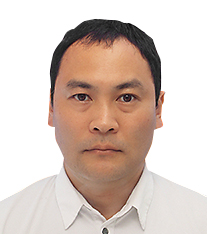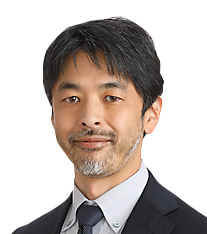- JST Home
- /
- Strategic Basic Research Programs
- /
 CREST
CREST- /
- Research Director/
- Exploring the Potential of Ocean Blue Carbon Through Investigation of Ocean and Carbon Cycling Interactions/
- [Carbon-Blue X] Year Started : 2024
[Carbon-Blue X] Year Started : 2024
Maki Aita Noguchi
Carbon cycle and lower trophic level oceanic organisms investigation for future environments
Grant No.:JPMJCR24J1
Research Director
Maki Aita Noguchi

Senior Researcher(Group Leader)
Research Institute for Global Change
Japan Agency for Marine -Earth Science and Technology
Collaborator
| Katsunori Kimoto | Senior Researcher(Dupty Group Leader) Research Institute for Global Change Japan Agency for Marine -Earth Science and Technology |
| Chiho Sukigara | Researcher Research Institute for Global Change Japan Agency for Marine -Earth Science and Technology |
| Kazuaki Tadokoro | Chief Scientist Fisheries Resources Institute Marine Environmental Division Japan Fisheries Research and Education Agency |
Outline
This project will apply numerical modeling and observations to evaluate the potential impacts of anthropogenic carbon dioxide-induced global warming and acidification on marine ecosystems and the carbon cycle. We will advance understanding of key physical and ecological processes and their potential feedbacks in order to enhance the ability to predict the impacts of future climate change. Our research focuses on understanding plankton response based on laboratory culture experiments and field studies, validating biological carbon transport using optical sensors and time-series mooring observations, and incorporating the results of the aforementioned studies in the development of dynamic models to capture the adaptive response of marine ecosystems.
Maiko Kagami
Integrative evaluation for carbon and biodiversity in coupled land-sea systems
Grant No.:JPMJCR24J2
Research Director
Maiko Kagami

Professor
Institute of Multidisciplinary Sciences
Yokohama National University
Collaborator
| Tomoya Iwata | Professor Graduate Faculty of Interdisciplinary Research University of Yamanashi |
| Hideyuki Doi | Professor Graduate School of Informatics Kyoto University |
| Akira Mori | Professor Research Center for Advanced Science aand Technology The University of Tokyo |
Outline
This study aims to elucidate the role of carbon and nutrients delivered from terrestrial areas to coastal ecosystems, and their relationship with biodiversity and carbon processes in forests and rivers. Based on observational data, we will develop a method to assess land-sea coupling in terms of carbon and biodiversity. We will analyze the relationship between carbon sequestration, land use in watersheds, and biodiversity, while also making future predictions for blue and green carbon. Furthermore, we will propose strategies for land-sea coupling and ecosystem management to optimize the ocean’s carbon sequestration capacity.
Toshihiro Somekawa
Contribution to marine decarbonization by the development of laser CO2 monitoring technique
Grant No.:JPMJCR24J3
Research Director
Toshihiro Somekawa

Chief Researcher
Laser Sensing Research Team
Institute for Laser Technology
Collaborator
| Toru Sato | Professor Graduate School of Frontier Sciences The University of Tokyo |
| Kiminori Shitashima | Specially appointed professor Faculty Tokyo University of Marine Science and Technology |
| Shigeru Tabeta | Professor Graduate School of Frontier Sciences The University of Tokyo |
| Hidetaka Houtani | Lecturer School of Engineering The University of Tokyo |
Outline
We contribute to marine decarbonization by developing the lidar technique, in- situ sensor measurements, and model simulations for the evaluation of CO2 reduction by blue carbon ecosystems and the CO2 leakage monitoring from a seafloor CCS site. Also, we develop an underwater towing towed vehicle equipped with the lidar system to maintain the height above the seabed and verify the applicability to underwater CO2 lidar monitoring through the simulated observation in real sea areas.
Kazutaka Takahashi
Mechanisms of carbon sequestration transported by vertically migrating biota
Grant No.:JPMJCR24J4
Research Director
Kazutaka Takahashi

Professor
Graduate School of Agricultural and Life Sciences
The University of Tokyo
Collaborator
| Yuji Okazaki | Group leader Fisheries Resources Institute Fisheries Research and Education Agency |
Outline
Zooplankton and micronekton are widely distributed in the ocean and exhibit diurnal and seasonal vertical migration between the surface layer and several hundred metres deep. This migration is known to transport a significant amount of carbon to the mesopelagic zone, resulting in carbon sequestration over hundreds of years. However, the characteristics of its variability remain poorly understood. In this study, we will use optical and acoustic techniques to estimate the spatio-temporal variability of active carbon transport by vertically migrating biota at high resolution over a large area around Japan. We will also assess the ecosystem feedbacks of this variability.
Gregory Naoki Nishihara
The accurate quantification and evaluation of the potential for seaweed aquaculture farms store blue carbon
Grant No.:JPMJCR24J5
Research Director
Gregory Naoki Nishihara

Professor
Organization for Marine Science and Technology
Nagasaki University
Collaborator
| Teruko Konishi | Professor Faculty of Agriculture University of the Ryukyus |
Outline
We will develop a technique to directly measure the CO2 fixation capacity of monoculture seaweed aquaculture farms by quantifying the amount of carbon absorbed by the cultivated seaweed and the amount of carbon respired and released as organic carbon. Focus will be placed on accurately calculating quantity of residual carbon stored in the environment by quantifying recalcitrant organic carbon (e.g., fucoidan). Additionally, we propose that NPP (Net Primary Production) and NEP (Net Ecosystem Production) are appropriate proxies for CO2 fixation, since they are more readily estimated. The results of this study is expected to contribute greatly to the development of related fields.













